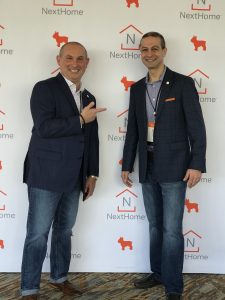David Caraboolad knows too well what it’s like to face all types of discrimination. From the rabid fear of Middle Easterners following the Sept. 11 terrorist attacks to the everyday awkwardness of people botching the pronunciation of his last name, the Lebanese-American has overcome a lot to become the successful real estate broker-owner that he is today.

David Caraboolad, right, with his business partner Vadim Barash
Like many minority real estate brokers, Caraboolad constantly faces the professional challenge of having to sell himself while selling properties. And like more and more people in the industry, he’s doing it very well. He and his partner Vadim Barash – an immigrant from Ukraine – now co-own NextHome Experience, one of the most successful brokerages in Columbus, Ohio, on pace to move 1,200 homes in 2019 with 84 agents.
For minorities, the road to success can be rough and boobytrapped with hate, but there can also be support and sources of strength along the way.
“I was certainly singled out as a foreign kid,” Caraboolad says. “I was born in Cleveland. My parents spoke Arabic in the home, and my grandmother, Victoria, has been my inspiration. She taught me what it was to be an entrepreneur.”
Though his family immigrated to the U.S. in 1895, there is still a tradition of hard work that rings true for most of the more recent immigrant families. In real estate, though, Caraboolad says there is an extra need for minority brokers to operate with integrity because it is ultimately a relationship business based on trust and results.
Caraboolad particularly remembers the days after the Sept. 11 terror attacks being challenging for business development. Like any salesperson, brokers are always battling perceptions, and race is one of those issues. “Having the names we have—or an accent or anything—makes our lives more challenging because we have to overcome that piece,” he explains.
Once a potential client or agent get to know Caraboolad and Barash, they say it becomes much easier and their transactional relationships often blossom into something deeper.
“We want dedicated producers and we want to build an atmosphere on family. If anyone gets to know us, they are an advocate for us,” Caraboolad said. “The most important thing to do is deliver on promises. Breaking promises breaks trust. If their trust is broken, there is no relationship.”

Irving Padron
Of course, not every minority broker shares the same challenge as the NextHome Team in Columbus. Down in Miami, Fla., where the bulk of the city is Hispanic, Irving Padron owns an Engel & Volkers brokerage and often competes against brokers of the same Cuban heritage. In that situation, Padron says the key is to stand out from the other Cuban brokers.
“I don’t wake up every morning and think: How am I going to overcome being a minority?” Padron says. “When you go out of town, that’s where you feel it.”
As a high-end broker focused on Miami’s most luxurious listings, Padron spends a lot of time courting investors and business partners across the U.S. as well as Canada and Europe. In these settings, he suddenly becomes an exotic commodity, and he says his background typically works as a strength because people expect him to have a unique perspective. It’s a lesson he teaches his agents—be an expert on your community but also build a broader world view.
“I encourage my agents to travel. Your view can be so myopic if you just stay,” Padron says. “Traveling is tremendously empowering because there are few people around the table who have my points of view. You are seen as a multicultural expert.”
His main advice for young minority agents and brokers is to find a good mentor. Many of the industry’s roadblocks, especially ones around race and ethnicity, can be navigated with the help of a good mentor, Padron says, adding that the best mentors and business partners sometimes can be found outside of the Hispanic community.
People come into real estate for all sorts of reasons, and each broker has his and her own personal challenges to conquer in order to be successful. There are also many commonalities that run across all races, ethnicities and genders, according to the National Association of REALTORS®’ groundbreaking study, 2017 Choosing a Career in Real Estate: A Perspective on Gender, Race and Ethnicity. For instance, self-motivation as well as people and negotiating skills were the most cited skillsets to be deemed important for a successful career in real estate.
The differences seemed to come up more with each professionals’ personal reason for entering the real estate industry. According to the report, “White and Caucasian members frequently reported that they liked real estate as it is an active job (as opposed to a desk job). Hispanic and Latino members frequently reported they liked working with people. Black and African American members frequently reported they had an interest in real estate and liked the salary possibilities. Asian and Pacific Islander as well as American Indian, Eskimo, or Aleut members frequently reported they liked flexible hours.”
A key difference in the minority experience has to do with the bottom line. While Asian-Americans seem to be making the most money, the study found a major gap between their income levels and those of their black peers.
“Asian and Pacific Islander residential-only specialists had the highest median gross annual income of all ethnic groups at $56,800 in 2016, followed by White and Caucasian at $54,200, and Hispanic and Latino members at $41,700, and Black and African American residential-only specialists at $23,000,” according to the study.
The report also found that most black REALTORS® are actually practicing real estate as a second job and rely on other sources of income. This suggests a major disparity in how each racial class views their respective real estate careers.

Fred Underwood
Fred Underwood, director of diversity for National Association of REALTORS®, says the real estate industry as a whole has historically lagged behind the national demographics with fewer minorities working in the industry compared to their respective percentages of the national population. However, he notes that great strides have been made in the past few decades, and the rate of diversity has outpaced the overall population.
It hasn’t entirely caught up from coast to coast, but certain markets, such as Chicago, have seen incredible progress that should give the rest of the country hope, Underwood says. For instance, the Chicago chapter of the National Association of REALTORS® had been all white into the 1980s, but leaders began making changes that have led to long-term, sustainable diversity within and atop the organization.
“Being inclusive takes time. Over the past 30 years, there has been a sea-change in that organization,” Underwood says. “The board is very diverse.”
Underwood added that as a national group NAR has a lot of work to do to prioritize inclusion and provide outreach to minority brokers. He said its leadership and the membership, alike, are heading in the right direction but that it will take time—and, more importantly, a concerted effort—to provide minority brokers throughout America an industry association that they deserve.
From an executional standpoint, a majority of the work is done at the local chapters; however, too often the national and local organizations undertake weak programs in the name of diversity but don’t do much more than merely pay lip service to the cause.
“There has to be intent,” Underwood says. “It has to be purposeful.”
Underwood noted that the large national real estate companies, including Berkshire Hathaway HomeServices and Realogy, have made inclusion a major corporate priority, largely because it makes good business sense to invest in reaching out to minority groups—whether it’s for partnering with broker/owners, hiring agents or finding buyers and sellers.

Luis Vega
For Luis Vega, franchise owner of Realty ONE Group Diamond in Long Beach, Calif., one area that can be improved at the national level is education—specifically, communicating with consumers through media and advertising about the value of REALTORS®, the importance they have in making sound transactions that build wealth, and the inclusion of minorities in that overall message.
Vega’s story starts like many Latino immigrants. He came to the U.S. from Mexico as a 5-year-old and quickly fell in love with America largely because of its diversity.
“I grew up listening to country music, heavy metal, grunge and hip hop at the same time Latin music was played at home by my parents so I had an understanding and appreciation for all music. I use music as an example because it connected me to different types of people, cultures, ethnicities,” Vega says. “I not only knew my culture but could communicate and connect with others nationally and internationally.”
Being multi-lingual is a huge advantage in business, especially in a diverse market such as Southern California, Vega says. Yet even in Long Beach, there is tension, prejudice and a risk that comes with being an ethnic minority. Vega says the key to thriving among such conditions is to not let others define you.
“As a minority owner the most important issue is to not be labeled a minority but a capable business owner who can provide a diverse workplace for talented employees and real estate agents—in which everyone is looked at for their talents, skills, abilities, personalities … not for their nationality, religion, gender, or gender preference,” Vega says. “I’ve never seen myself as a minority. I played sports, went to school, focusing on the success my abilities brought to me, not what was given to me. So, as a minority to others, if you see your ethnicity being a weakness, you need to change that perspective and see it as your strength. People may disagree with me, and I’ve been discriminated against, but I think we all have of any color or race. It just can’t be an excuse to not succeed.”
 Andrew King is a contributing editor to RISMedia.
Andrew King is a contributing editor to RISMedia.






When I changed my perspective as a minority immigrant Realtor, That is when my career took off. Real estate is a a relationship business and as a minority that is where you start. people who would identify with you . Those are your low hanging fruits. Then you expand from there without forgetting your base. What is perceived as a weakness becomes your your strength. Focusing on the positive side and caring for people and being very professional will earn you trust . Building confidence and not being a secret agent are some of the things i would recommend.I went from being a part time agent to making hundred’s of thousands a year.
Excellent perspective! Regardless of race, ethnicity and gender success requires developing skills, setting goals and a commitment to put the hard work in. No excuses!